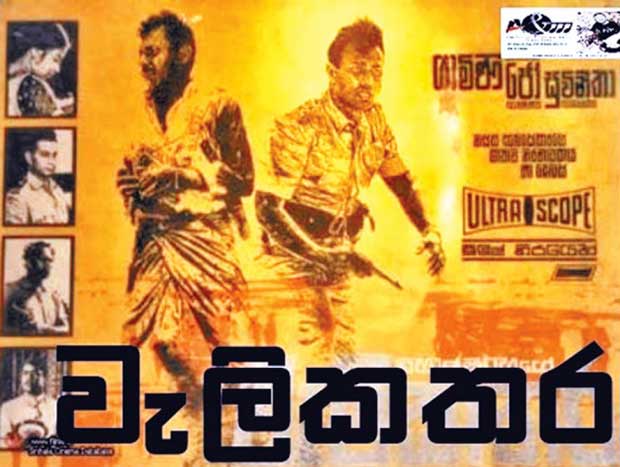Reply To:
Name - Reply Comment
Last Updated : 2024-04-18 14:06:00

 D. B. Nihalsinha’s ‘Welikathara’ (desert) is back running in our cinemas in digital version. As a long time admirer of this ground-breaking film (both artistically and technically), I’m glad about this attempt to introduce a somewhat obscure thriller to today’s generation (obscure? Ask anyone under 30 if they’ve heard of it, and never use the word ‘classic’ – and in black and white to boot – or they’ll keep away in droves).
D. B. Nihalsinha’s ‘Welikathara’ (desert) is back running in our cinemas in digital version. As a long time admirer of this ground-breaking film (both artistically and technically), I’m glad about this attempt to introduce a somewhat obscure thriller to today’s generation (obscure? Ask anyone under 30 if they’ve heard of it, and never use the word ‘classic’ – and in black and white to boot – or they’ll keep away in droves).
The film remains unsurpassed in its examples of dramatic irony. My favourite is when Joe Abeywickrema, as the thuggish Goring mudalali, approaches the unsuspecting Swineetha Weerasinghe, the police superintendant’s haughty wife recently arrived in Jaffna and enjoying the sea breeze after a drive, walks around her husband’s official Peugeot 203, and tells her nonchalantly that it reminds him of lightning-fast Cotton Hall (a famous race horse belonging to the Selvaratnam Stables and trained by Mehi Hussein). Then he lets the air out of a tire and tells her to walk home, enjoying the breeze.
The idea of this short piece, however, is to discuss Welikathara’s politics. It’s not a political film. But every film, book, play or piece of music by a serious artist is coloured by the creator’s politics, more or less
It’s hardly a coincidence that, in its final sequence, the young Tamil woman in distress is asked if she needs help by a Sinhalese lorry driver
Sinhala cinema rarely bothered about ethnic representation. Even in its commercial form, it has no equivalent of the Hollywood formula of the black cop-white cop combination
These are among the finest moments in the life of Tissa Abeysekara as a scriptwriter, though he himself didn’t think much of them. Talking to me once, he dismissed Welikathara as a mere ‘action film.’ But I think some of his most inspired moments are here rather in the ponderous epics he made later on as a director.
The idea of this short piece, however, is to discuss Welikathara’s politics. It’s not a political film. But every film, book, play or piece of music by a serious artist is coloured by the creator’s politics, more or less. Tissa’s politics were leftist, while Nihalsinha could be described as centrist in his politics. They didn’t get together to make a political statement in Welikathara. But the underlying political message running through the film, intentional or otherwise, is fascinating nonetheless.
We know that the Jaffna peninsula has been the historic centre of Tamil politics, culture, religion, commerce and much else down the centuries. But, after watching Welikathara, anyone who doesn’t know that might be excused for thinking that Jaffna is just another typical province of Sri Lanka run by the Sinhalese. All major characters are Sinhalese, and Tamils are either smugglers or background characters. In an early action sequence, Fonseka surprises and guns down one. Another scene where he was shown assaulting a suspect in custody was severely cut by the censor.
No one can call Welikathara a ‘nationalist’ (or chauvinistic) film. That wasn’t the film makers’ intention. But the existing majority political thinking is ingrained in it like a tattoo on the forehead. All the policemen in it are Sinhalese. Gamini Fonseka’s (the police superintendant) personal assistant is a Sinhalese. So are most of his associates at the club, or indeed his principal rival Goring Mudalali. Though Jaffna before its pre-LTTE days was a multi-ethnic society with many Sinhalese traders and bakers living there, baking bread is still a long way away from monopolizing an extortion and smuggling racket.
Goring’s trusted bodyguard is Tamil. But he’s just a thug. Goring is the thug who really counts, and he’s a Sinhalese. This film has Sinhalese cultural and political complacency written all over it, just as ‘Elephant Walk’ (1954) has neocolonial complacency written all over it though it isn’t a political film at all (no more than a dangerous confrontation between white planters and wild elephants in an exotic setting. The locals don’t count).
All these are very charming films, but the underlying politics need to be put in perspective. The Jaffna peninsula of Welikathara is Sinhalese-dominated. It isn’t even explained how a Sinhalese thug could take over the underworld in Jaffna like a southern Siva dancing a macabre dance of death and destruction in an alien land. What were the Tamils doing while Goring was reigning supreme in Jaffna? The underworld has its own politics (as many politicians know).
The Sirima Bandarnaike government introduced the policy of standardization in the early 70s to counter what it saw as discrimination against Sinhalese students at university level. This led to the Tamil students League, said to be inspired by the 1971 JVP insurrection and the first Tamil rebel group to be formed, with Sathyaseelan, Padmanabha and Prabhakaran in its ranks. All this might seem irrelevant in the context of discussing a thriller, but once we know these little details, it becomes very difficult to explain Goring Mudalali’s reign in Jaffna.
After all, Welikathara was released in 1975, the same year in which Jaffna’s SLFP major Alfred Durayappah was killed by Prabhakaran. It’s hard to ignore these facts when watching Welikathara. A senior policeman in Jaffna can’t be ignorant of the militant student politics, but his main concern in the film is smuggling. And at the club, they are listening to Hindi broadcasts from All India Radio. In this context, Welikathara is entirely a southern affair conducted in the placid land of Tamils, where age-old harmony is only interrupted by a little smuggling (again controlled by a Sinhalese).
It’s most interesting to reflect what Welikathara would have been like if Joe Abeywickrema played a Tamil screen personae – instead of a shy Sinhalese village boy whose sister is abused by an upper class young gentleman, if he played the role of a shy Tamil youth (though, given the rigid structure of the pre-war caste-based Jaffna society, it’s hard to imagine even a Tamil from the south becoming a mafia boss in Jaffna, let alone a Sinhalese who doesn’t seem to know much Tamil). In key moments in the film, Joe shouts his commands (wedi thiyapan, yakko) to his Tamil bodyguard in Sinhala!
Of course one can argue that a film with a strong Tamil character may not have succeeded at the box office as Welikathara did. Sinhala cinema rarely bothered about ethnic representation. Even in its commercial form, it has no equivalent of the Hollywood formula of the black cop-white cop combination, and what Quentin Tarantino has achieved with his Django Unchained (with a black superman cowboy fantasy) is still unthinkable in our context (with a Tamil character in place of an African-American), even after all this mayhem and talk of ethnic harmony and reconciliation.
None of this is meant to detract from the obvious qualities of Welikathara. Back in 1974-75, few people thought of student militancy, Tamil or Sinhalese, worthy of serious study. After all, as 1971 showed, insurrections could be crushed, and life goes on as usual.
The same complacency hasn’t changed in many places even today, even after two bloody southern rebellions and one terrible civil war commenced in the north. One might be excused for thinking that the Sinhalese, whether film makers, politicians, or the military, are perpetually living in the past where Jaffna is concerned.
Even today, when you travel to Jaffna, almost all the policemen and soldiers one is likely to encounter are Sinhalese. Even Asoka Handagama’s Ini Awan, a politically more conscious film than Welikathara, failed to take note of this in a very myopic way. It’s hardly a coincidence that, in its final sequence, the young Tamil woman in distress is asked if she needs help by a Sinhalese lorry driver. That might be a cutting edge example of ethnic harmony – or a sop to the Sinhalese psyche, relieved at last to hear a few Sinhala words spoken in a strange land.

Add comment
Comments will be edited (grammar, spelling and slang) and authorized at the discretion of Daily Mirror online. The website also has the right not to publish selected comments.
Reply To:
Name - Reply Comment
On March 26, a couple arriving from Thailand was arrested with 88 live animal
According to villagers from Naula-Moragolla out of 105 families 80 can afford
Is the situation in Sri Lanka so grim that locals harbour hope that they coul
A recent post on social media revealed that three purple-faced langurs near t